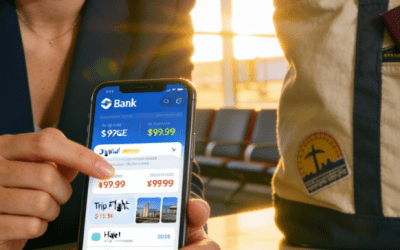Interactive maps have revolutionized the travel industry, making it easier and funnier to plan a trip or to discover destinations. Explore the transformative force of personalized interactive route maps and how they can grow your business significantly.
Whether it is for a short distance or a multi-destination trip, making travel arrangements is often a time-consuming process with several aspects to be taken into account, from hotel bookings to daily activities and route outlines. For this reason, customized travel content has become a must-have for any business within this evolving industry.
Interactive route maps have become one of the most popular tools for a successful travel planning experience, not only because of their helpful user features, but also because of their potential ability to increase businesses’ revenue. In other words, interactive maps are an absolute win-win for both customers and companies.
In this article, we will explore how interactive route maps can both enhance the user experience and improve conversion rates for businesses, two promising benefits that can only bring good results – engaging current customers, attracting new ones, propelling sales and empowering brands, just to name a few.
Inside a traveler’s mind
As someone who is planning a trip, one of the first tools we would consider using nowadays is an interactive map, where we would be able search for destinations, check distances and determine the best route that suits our needs. And even if we don’t know exactly where to travel, an interactive map is a great starting point to do some research and find cities or attractions of our interests.
Interactive maps are typically used to outline the route of a trip by listing the locations to be visited and visualizing them on a live map, which makes it easier to search and discover places within close distance and, ultimately, create an itinerary.
However, this research has to be done manually on most average applications, which can get complex or tiresome for us as users, especially if we are not familiar with the destinations or if we are not sure what to look for.
We may have three or four places in our bucket list, but we would need to take some extra time to search for additional attractions through the map, figure out how we can fit them in our schedule, and take any additional action by our own means – making a reservation, buying a ticket, or even contacting them to get information we cannot find at first hand.
Fortunately, over the last decade interactive route maps have improved their functionalities and user features to provide more insights on the destinations. If we look for any tourist attraction on an interactive map, we will probably be able to view not only its location and how to get there, but also some key details such as contact info, open hours, crowd peaks and user reviews.
This is the result of the increasing influence of UX and its positive impact on users’ interactions with companies’ websites and applications.
The power of user experience
UX design and techniques have proved to contribute in building positive relationships between brands and their end-users. To achieve this, companies are constantly analyzing the interactions users have with their brand, products and services, to determine different trends and understand what customers value the most, what their specific needs are, which products are the best for them, and many other factors.

If you are looking to grow your business within the travel industry, a thorough and well-executed UX strategy will be a great way to drive your brand to success. These are just some of its benefits:
Boosts brand identity
First impressions are one of the most important factors when it comes to decision-making. A good user experience should reflect the target audiences and their preferences from the get-go, empowering customers to identify with the brand from the very beginning. Interactive route maps, for example, have become increasingly more popular and competitive since their providers started enhancing their features based on UX analysis.
Fosters customer loyalty
There is nothing more powerful for a business than the trust from its clients, customers or end-users. A new customer is most likely to buy your services over the competitions’ if they feel they have had a good experience with your brand; a current customer will probably recommend your services to others and will remain loyal to your brand as long as they feel valued and represented by it.
Reinforces online presence
In today’s business world, having a strong online presence is just as important as providing a quality service. UX allows companies to share personalized content with customers via email or through interactions with apps and websites, which contributes to enriching the brand’s online presence: the better interactions people have with your business through online channels, the more popular and well-known your brand will be.
Increases sales revenue & conversion rates
An interactive map with customized travel content is very likely to engage travelers at the awareness stage, which helps them make decisions easier and faster. As a result, conversion rates improve significantly, since customers get exactly what they want right from the start.
Smartvel’s interactive map Explore&Go, for example, has several features and filters that can be applied beforehand, to only showcase destinations that meet preferred criteria. It also adds booking links to encourage people to take action, giving that extra push that turns curious or undecided trip planners into determined customers.

UX in the travel industry: smart solutions for smart travelers
Personalized travel content has opened the door to multiple opportunities for both customers and businesses. Interacting with travelers through a route map makes it possible for multiple brands to engage with them at every stage of their journey, from the first to the last city of their itinerary.
An interactive route map can display cultural or culinary options at each destination, allowing local businesses to be showcased. They can help companies engage with customers with tailored recommendations, and they can even feature a live local agenda for every destination where companies can display their services and offer activities of any sorts.

Utilizing interactive route maps is also beneficial for travelers themselves in many ways, starting with the amount of information available and easily accessible that an interactive map can contain. They can suggest must-visit destinations or must-see experiences, as well as best hidden spots or exclusive venues that only locals would know, allowing for some great offbeat tourism.
Tailored through best UX practices, interactive route maps can serve as planning agendas for any type of traveler at any given moment; they could outline the best experience for a lonely ranger or for a whole family, and they could be used to either plan a weekend getaway or a two-months’ trip around the world.
And just in case we haven’t had enough examples of win-win scenarios fostered by interactive route maps, let’s not forget that many businesses within the travel and hospitality industry usually have last-minute deals on flights, hotel bookings or tickets for events or attractions. Flight companies, hotels or tourism agencies could potentially increase their sales by simply showcasing discounts on an interactive route map, and customers could of course take advantage of these deals, which ultimately contributes to enhancing their user experience.






